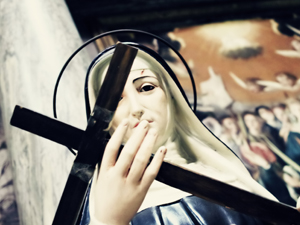 I’m really not one to talk about voluntary sacrifices I make — the whole “do not let your right hand know what your left hand is doing” thing. It’s something between me and God. But, I happened to casually mention to a friend that I was basically doing another Lent for 40 Days for Life, which began September 28th and runs through November 6th. The response? “Wow! That’s really stupid.”
I’m really not one to talk about voluntary sacrifices I make — the whole “do not let your right hand know what your left hand is doing” thing. It’s something between me and God. But, I happened to casually mention to a friend that I was basically doing another Lent for 40 Days for Life, which began September 28th and runs through November 6th. The response? “Wow! That’s really stupid.”
It was not that this individual thought that the pro-life movement was stupid . No, this person is staunchly pro-life. Rather, it was the idea that I thought that my giving up something would in any way help the cause.
At first, I was deeply offended. As I thought more about it, however, I realized that most people probably share my friend’s opinion and it was worth giving some time (and a column!) to. Do our sacrifices actually matter or I am simply denying myself needlessly? If they do matter, how does it work?
Obviously, this kind of sacrifice is different than the Lenten version, which is done in a spirit of mortification and penance – to acknowledge and make reparation for one’s own sinfulness and attachment to worldly goods and to focus more on God and prayer. This type of sacrifice isn’t being offered up for oneself, but rather for another.
The answer lies in the Catholic belief in the Communion of Saints. We profess this every week when we say the Nicene Creed at Mass: “We believe in the Communion of Saints,” but what does that actually mean? It means that all of us — those in heaven, those in purgatory, and those of us struggling here on earth are all interconnected.
The Catechism of the Catholic Church states the following:
The Christian who seeks to purify himself of his sin and to become holy with the help of God’s grace is not alone. “The life of each of God’s children is joined in Christ and through Christ in a wonderful way to the life of all the other Christian brethren in the supernatural unity of the Mystical Body of Christ, as in a single mystical person.”
In the communion of saints, “a perennial link of charity exists between the faithful who have already reached their heavenly home, those who are expiating their sins in purgatory and those who are still pilgrims on earth. Between them there is, too, an abundant exchange of all good things.” In this wonderful exchange, the holiness of one profits others, well beyond the harm that the sin of one could cause others. Thus recourse to the communion of saints lets the contrite sinner be more promptly and efficaciously purified of the punishments for sin. (1474-1475)
Therefore, the good acts of one can indeed help someone else. Pope Benedict XVI emphasized this idea in his Lenten message for 2009. He stated that “by freely embracing an act of self-denial for the sake of another, we make a statement that our brother or sister in need is not a stranger.” In the case of “Forty Days for Life,” those participating are offering sacrifices and prayers to help unborn children and their mothers, all of whom are most certainly part of the Communion of Saints.
A belief in the value of sacrifice to help another person takes faith. Like many other situations, we may never see the fruit of our actions. People may indeed think that we are being dumb and denying ourselves needlessly. We trust in God and in his mercy and humbly offer our small gifts of self-denial. In the end, God’s opinion is the only one that truly matters.



